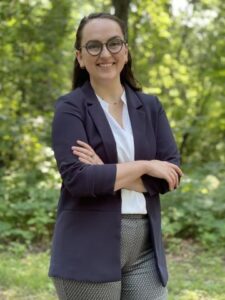Korbel ranked 12th best place in the world to earn a master’s degree in international relations.
Korbel ranked 20th in the world for the best undergraduate degree in international studies.
Korbel ranked 12th best place in the world to earn a master’s degree in international relations.
Korbel ranked 20th in the world for the best undergraduate degree in international studies.
Scrivner Institute Community Profiles: Dr. Kaitlyn Sims

Korbel and Scrivner truly support the kinds of research I want to do and evidence I want to produce. I'm able to think about big questions, interdisciplinary collaborations, and mixed-methods evidence, which is honestly the dream. I appreciate how the small class sizes help me get to know my students. Everyone has been so welcoming and friendly.
I teach MPP Microeconomics for Public Policy as well as Cost-Benefit Analysis, and I teach an undergraduate course on Economics for Public Policy.
I’m an economist by training, but my work is very interdisciplinary. Broadly speaking, I'm interested in how people make the best choices they can in times of stress and crisis. This includes studying survivors of domestic violence, people involved with the criminal-legal system, people who are trying to access safe and secure housing, and those facing other major public policy challenges. I work with psychologists, political scientists, sociologists, and criminologists, to name a few, to build a mosaic of evidence on these tough topics.
I’m currently collaborating with faculty at UW-Madison on a program evaluation of the Wisconsin Domestic Violence Housing First pilot program. This program offers funding to nine domestic violence service providers in the state to implement the Housing First philosophy, which prioritizes mobile advocacy and flexible financial assistance to meet survivors where they are. We know that safe and secure housing is a major problem for Domestic Violence survivors, so Housing First can be a great way to secure housing without necessarily moving survivors out of their current home.
Scrivner takes a broad approach to the concept of being a “public policy” program – we as faculty are interested in huge, challenging topics, and the Institute offers support to start chipping away at these research agendas. Our faculty have such varied interests, but we are able to find how our work overlaps in super interesting ways. We take research from local to global and global to local, meaning that we prioritize how we can make our findings actionable and work with policymakers and practitioners to actually make change.
The students are incredibly empathetic and kind, and I really love how willing they are to think critically about the world around us. My colleagues are so much fun to be around and have such interesting work. I've loved getting to know them.
In all of my classes, part of the last day of class is fostering a long reflection and synthesis conversation, and it's my favorite day of the quarter by far. Students are so eager to talk about what they’ve learned, how it relates to the things they are passionate about, questions they still have going forward, and more. It's so rewarding as a professor to see students fired up about how they can apply economic theory to their lives and careers.
Coming from Wisconsin, these winters are a dream -- I love spending time outside with my pup and going for long walks near Sloan’s Lake and in the highlands.
Copyright ©2025 | All Rights Reserved | Equal Opportunity Affirmative Action Institution